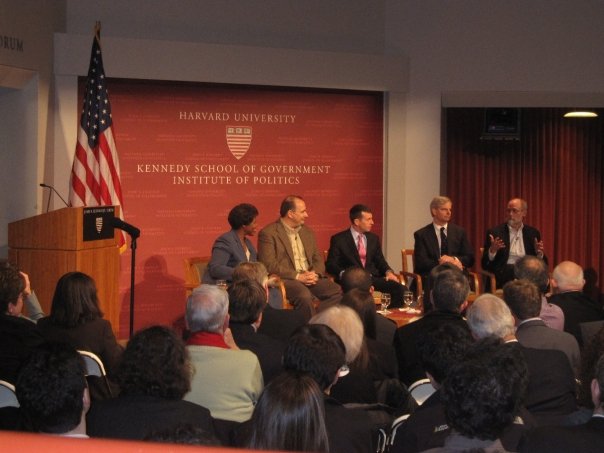Yesterday at the Kennedy School of Government I attended the IOP Forum “War Stories: Inside Campaign 2008”, where David Axelrod (Chief Strategist, Obama Campaign) and David Plouffe (Campaign Manager, Obama Campaign) discussed with Rick Davis (Campaign Manager, McCain Campaign) and Bill McInturff (Chief Pollster, McCain Campaign) the 2008 presidential campaign, in an open forum. This forum was part of a tradition, the John F. Kennedy, Jr. forum series organized by the Harvard Institute of Politics, which for years has been inviting politicians, academics and journalists to debate current issues in front of an audience, made up mostly by students but also by journalists, politicians etc. These forums are moderated and they conclude with a question and answers sessions with people in the audience. As I sat there listening to the campaigners recall events and anecdotes from the campaign, and analyzing achievements and mistakes made, I could not help but thinking about the transparency and accountability promoted by such events. And wondering when there will be a day in my home country when similar events will take place….
Tag: palin
the Internet and politics: analyzing the 2008 US election
A group of McCain and Obama campaigners, academics, activists, bloggers and journalists have gathered for two days at Harvard at a conference organized by the Berkman Center for Internet and Society examining the role that the Internet has played in the the 2008 US election. Parts of the conversation were under Chatam house rule, nevertheless here are some highlights of the lively discussions that have taken place. Some preliminary outputs of the meeting can be found here in essay format and other Berkman colleagues have blogged about the event here and at the Internet and Democracy blog.
The first day of the discussion focused very much on the role played by the Internet in the campaign. Did Obama win thanks to the Internet? Did the Internet play a role in engaging people who would have not otherwise been engaged? The first question was prominent, and the message that was stressed many times over and over, especially by Obama campaigners, was that the Internet served as a wonderful tool to coordinate and link online and offline action, with the technology playing a central but complementary role to the efforts of offline grassroots organizing. I came home with the feeling that top-down strategy played the key role in getting people involved, but that success depended very much also on the bottom-up grassroots efforts and energy that Obama and his campaign people managed to mobilize and draw upon. Continue reading “the Internet and politics: analyzing the 2008 US election”

